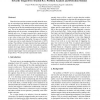Free Online Productivity Tools
i2Speak
i2Symbol
i2OCR
iTex2Img
iWeb2Print
iWeb2Shot
i2Type
iPdf2Split
iPdf2Merge
i2Bopomofo
i2Arabic
i2Style
i2Image
i2PDF
iLatex2Rtf
Sci2ools
DATE
2008
IEEE
2008
IEEE
Towards Trojan-Free Trusted ICs: Problem Analysis and Detection Scheme
There have been serious concerns recently about the security of microchips from hardware trojan horse insertion during manufacturing. This issue has been raised recently due to outsourcing of the chip manufacturing processes to reduce cost. This is an important consideration especially in critical applications such as avionics, communications, military, industrial and so on. A trojan is inserted into a main circuit at manufacturing and is mostly inactive unless it is triggered by a rare value or time event; then it produces a payload error in the circuit, potentially catastrophic. Because of its nature, a trojan may not be easily detected by functional or ATPG testing. The problem of trojan detection has been addressed only recently in very few works. Our work analyzes and formulates the trojan detection problem based on a frequency analysis under rare trigger values and provides procedures to generate input trigger vectors and trojan test vectors to detect trojan effects. We also pro...
| Added | 29 May 2010 |
| Updated | 29 May 2010 |
| Type | Conference |
| Year | 2008 |
| Where | DATE |
| Authors | Francis G. Wolff, Christos A. Papachristou, Swarup Bhunia, Rajat Subhra Chakraborty |
Comments (0)

